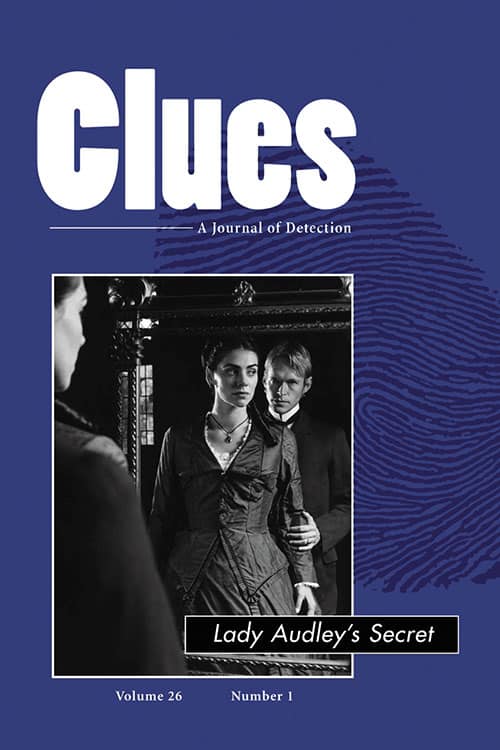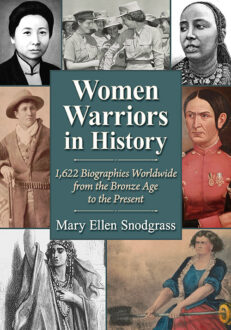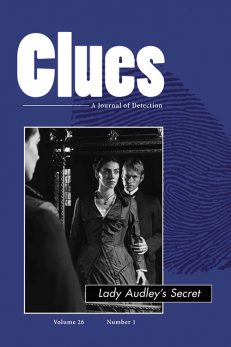Clues: A Journal of Detection, Vol. 26, No. 1 (Spring 2008)
Print Back Issue$30.00
In stock
About the Book
BACK ISSUE
This is a single back issue only. To order a current subscription, or for more information, please visit the journal’s web page at CluesJournal.com. Back issues from earlier volumes of Clues are available for order subject to availability. Also, single issues of the current volume may be ordered one at a time. Individuals may order back issues directly from our online catalog, and the charge for individuals is $30 (excluding postage). Issues from Volume 33 to the present are also available in ebook format on Kindle, Nook and Google Play.
The charge for single issues for institutions is $75 per issue (excluding postage). If your institution requires a back issue, please contact us to order at the appropriate rate.
About the Author(s)
Bibliographic Details
Executive Editor Margaret Kinsman
Managing Editor Elizabeth Foxwell
Format: softcover (6 x 9), back issue
Pages: 94
Bibliographic Info:
Copyright Date: 2008
ISSN 0742-4248
Imprint: McFarland
Table of Contents
Theme Issue: Victorian Detective Fiction, Part 2
Guest Editor: Janice M. Allan
Publisher’s Comments 3
Introduction 5
Janice M. Allan
Edward Bulwer Lytton and the Development of the English Crime Novel 8
Lucy Sussex
Now popularly known as a poor writer, Edward Bulwer Lytton (1st Baron Lytton, 1803–73) was a major Victorian novelist. The author examines his contributions to the crime genre, arguably his best works, including Paul Clifford (1830), Eugene Aram (1832), and Night and Morning (1841).
A Case for the Re-covered Writer: Harriet Prescott Spofford’s Early Contributions to Detective Fiction 23
Rita Bode
The prolific output of popular American writer Harriet Prescott Spofford (1835–1921) includes three detective stories. The author argues that these may well constitute the earliest stories of detective fiction authored by a woman. In addressing detection’s uses of technology, the detective’s ethical concerns, and the detective story’s potential for social criticism, Spofford’s stories are remarkably forward looking and represent a significant contribution to the development of the genre.
The Real Sensation of 1887: Fergus Hume and The Mystery of a Hansom Cab 37
Christopher Pittard
The Mystery of a Hansom Cab, Fergus Hume’s first novel, was published in 1886 in Australia and in the United Kingdom the following year to immense commercial success. The author offers a number of possible explanations for the novel’s success and its subsequent obscurity.
Detecting the Self in the Sensation Fiction of Wilkie Collins and Mary Elizabeth Braddon 49
Anne-Marie Beller
In many of their sensation novels, Collins and Braddon used the detection process to explore a sense of disorientation and identity anxiety. The art of detection (one that attempts to control, and ultimately understand, the world and one’s own place in it) is dramatically undermined in these novels by the revelation of self-division and incoherence.
The Healing Art of Detection: Sherlock Holmes and the Disease of Crime in the Strand Magazine 62
Maria Cairney
The author discusses the construction of crime as disease and the role of detection in the first series of Holmes stories (published in the Strand from July 1891 to June 1892). Reading the stories alongside other early Strand texts and examples of fin-de-siècle discourses of crime and social reform, she explores the associative links among crime, disease, detection, and healing.
Reclassifying the Female Detective of the Fin de Siècle: Loveday Brooke, Vocation, and Vocality 75
Therie Hendrey-Seabrook
Highlighting the cultural significance of class correlated to the exercise of voice in the professional configuration of Catherine Louisa Pirkis’s Loveday Brooke, the author contends that the social respectability of her voice works to temper the degree of cultural transgression usually perceived as being attached to fictional female detectives in terms of surveillance.
Contributors 89
Author Guidelines 90
Book Reviews & Awards
- “Clues is a must-have for readers and writers of crime fiction. Scholarly, thought-provoking, wide-ranging in its topics, Clues covers the crime and thriller map.”—Sara Paretsky
- “A. Conan Doyle, notoriously resentful of Sherlock Holmes’s success, liked to scorn ‘police romances’ as less significant and worthy of his talents than his other literary work. If he could have read Clues, the thinking mystery reader’s journal, he would surely have felt differently—and learned much he never realized himself about even his own landmark contribution to the genre, from which so much else by others has flowed.”—Jon Lellenberg, U.S. agent for the Arthur Conan Doyle estate
- “I love reading Clues. Every issue provides thought-provoking, well-researched articles. The variety and scope of the material found in Clues makes an unparalleled, ongoing contribution to our understanding of the role of crime fiction in our culture, and the genre’s reflection of its time and society.”—Jan Burke, Edgar-winning author of The Messenger (2009)
- “Clues is an important journal. It carries the torch of tradition that is the backbone of detective fiction. It goes below the surface and gets to the heart of what makes the genre so fascinating and valid today”—Michael Connelly, author of the Harry Bosch novels, including The Overlook (2007)
- “For erudite and fascinating truths about mysteries, follow the clues to Clues, the scholarly journal that is an essential resource for every serious student of the mystery”—Carolyn Hart, author of Death Walked In (2008)
- “With scholarship ranging from Poe to Peters, nothing beats Clues”—Joan Hess, author of Mummy Dearest (2008)





